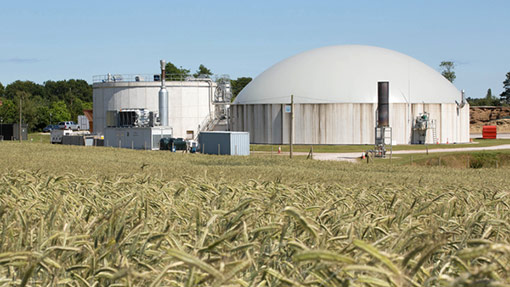Boost to biofertiliser market could aid farmers

Following changes to the certification of biofertiliser, more high-quality digestate is set to enter the market.
Updated specifications, PAS 110, published today (Wednesday 30 July) by the British Standards Institute, will enable more AD plants to achieve certification through the Biofertiliser Certification Scheme (BCS) and increase the quality of digestates, says the Renewable Energy Association (REA).
To gain BCS-certification, the thoroughness of the anaerobic digestion process will be tested, to ensure the biofertiliser produced is more highly digested – equivalent to pig slurry as opposed to cow slurry.
See also: Look to the future when planning farm renewables
Other changes to the specification include the tightening up of limits on physical contaminants, such as plastic, to increase the quality of biofertilisers.
“Digestate from AD is a valuable fertiliser and can help meet the nutrient requirements of crops and offset the environmental and financial cost of manufactured fertiliser.”
Anna Simpson, NFU
“For AD plants using waste products as feedstock, BCS certification means avoiding the need for waste controls on the digestate that the AD plant produces,” said Ciaran Burns, head of certification at Renewable Energy Assurance (REAL), a subsidiary company of REA which runs certification schemes.
“This means significant cost savings for the AD operator but also permits the digestate to be used without prior approval from the Environment Agency and means that farmers who want to use a digestate can get access to it much easier and quicker.
The market for biofertiliser is likely to grow, says REA, as more farmers become aware of the financial and environmental benefits of safe, high-quality digestate and more AD plants gain certification.
See also: Decc issues biomethane tariff reassurance
Biofertiliser is already considerably cheaper than synthetic fertilisers, but only 15 AD plants in the UK sell certified products. However, there are 130 on-farm AD plants and 340 projects under development.
“Digestate from AD is a valuable fertiliser and can help meet the nutrient requirements of crops and offset the environmental and financial cost of manufactured fertiliser,” said NFU environment policy adviser Anna Simpson.
“The PAS 110 helps farmers ensure that the digestate they accept and use is of a specified standard and ensure the quality of the end material.”
Farmers with AD plants do not need to gain certification if they only spread the biofertiliser on their own land, but certification must be sought if they intend to sell the product to another farmer or grower.
To find out about becoming certified or buying accredited biofertiliser, contact the BCS on 020 7981 0853 or visit www.biofertiliser.org.uk. An admin fee is charged for certification.
